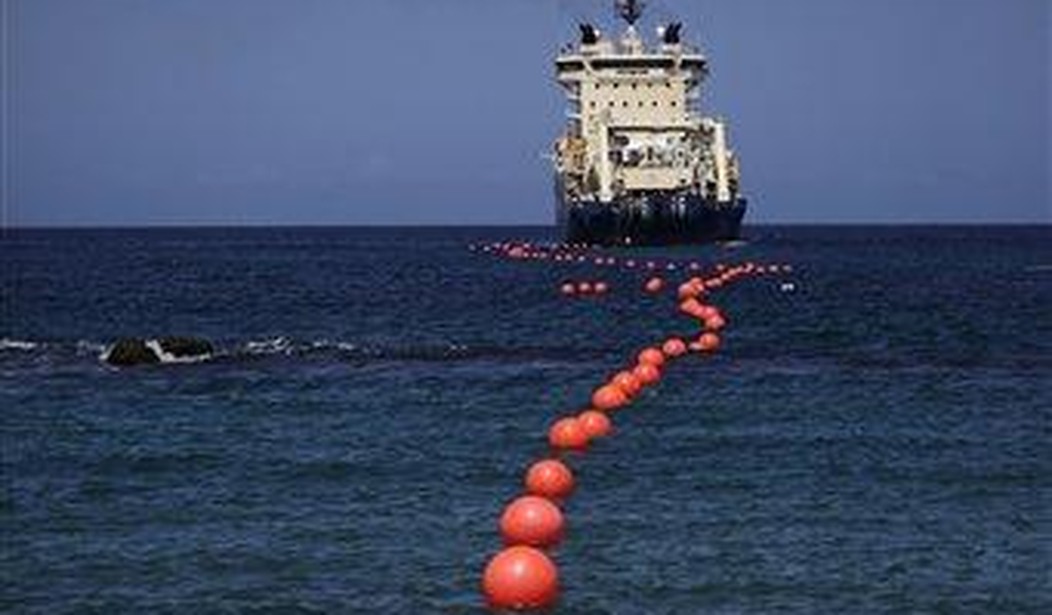There's a hybrid war underway beneath the world's oceans, where about 870,000 miles of data cables lie on the sea floor. For the last several years, Russia has dispatched its spy fleet to map out where these vital cables are located, and its "shadow fleet" of ships not operating under the Russian flag but following orders from Moscow has gone so far as to cut the cables in several places.
NATO says that 99% of the world's data is transmitted via undersea cables as well as an estimated $10 trillion in financial transactions. These critical cables are extremely vulnerable.
The U.S. and NATO have not been standing still. Great Britain recently dispatched two warships and several aircraft after a known Russian spy ship, "Yantar," settled over some critical cables in British waters. The military assets were sent to let the Russians know that the gesture wasn't welcomed.
The Russian embassy in Great Britain feigned innocence. “The accusations made by the British defense establishment that Russia poses some kind of threat to the submarine communications of that country and its NATO allies are completely untenable,” it said. “Russia has never made such threats.”
"Submarine communications" refers to the whole panoply of cables that crisscross the world's oceans. Since the cables are located thousands of feet underwater and usually in remote locations, protecting them is a challenge.
In an increasingly fraught hybrid war between Russia and the West, undersea cables and pipelines are a soft-under belly. The length and remote location of the cables leaves them vulnerable to sabotage. Any successful attack could have a big knock-on effect. Undersea cables are vital for funneling both data and energy across the globe. According to the North Atlantic Treaty Organization, 99% of the world’s data is transmitted through subsea cables, including an estimated $10 trillion a day in financial transactions.
Since starting the full-blown war in Ukraine, Russia is suspected of being increasingly willing to rip these cables up to destabilize its opponents. However the alleged attacks, often in remote locations by boats that aren’t even under Russian flags, makes it hard to pin the blame.
This month, NATO announced a new mission to provide additional surveillance of submarine communications. This week, Britain said it would send some submarine-hunting assets, including American-made P-8 Poseidon aircraft and spy planes, to the Baltic. Sending NATO military assets right into Russia's backyard is a clear signal and warning to Putin; look, but don't touch.
“Russia’s use of the so-called shadow fleet poses a particular threat to the maritime and environmental security in the Baltic Sea region and globally,” NATO allies said in a joint statement.
Two high-profile investigations related to suspected sabotage in the Baltics are ongoing. Finland detained a Russian shadow fleet tanker called Eagle S after its anchor severed a power cable linking the country with Estonia in December. Eight crew members have been identified as suspects but Finnish investigators haven’t been able to raise any charges related to the cutting of the cable. The ship is sailing under the flag of Cook Islands. Finnish authorities indicated that they could withhold the cargo—Russian oil—because of customs violations.
Another investigation targeted a Chinese ship whose anchor had "accidentally" cut two cables in German waters. The Germans negotiated for weeks with the Chinese to board the ship. After finally receiving permission, the German engineers who inspected the craft found nothing.
Related: NATO Chief Says Trump 'Is Right' About European Defense Spending
While the cables are vulnerable, creating a significant interruption in data transmission would require detailed knowledge "of which cables lead to what and where they are," according to the Journal. Russia has been mapping the location of these cables for years and, presumably, has been able to tap into them to identify what kind of cables they are and what data is being carried.
It's another national security chokepoint that needs to be monitored.










Join the conversation as a VIP Member